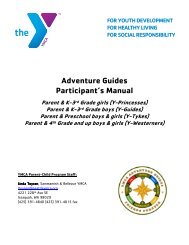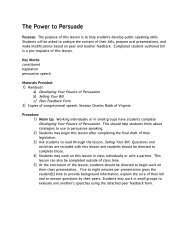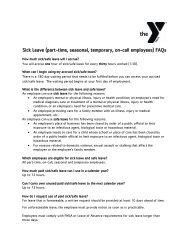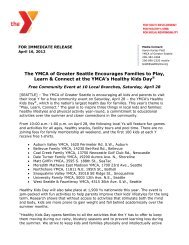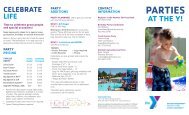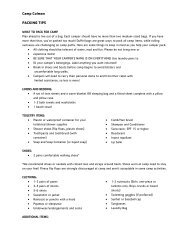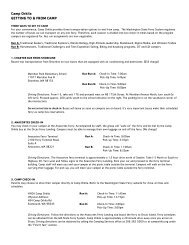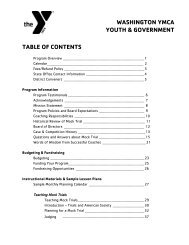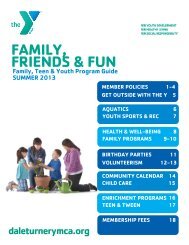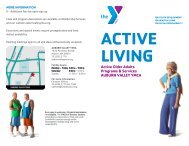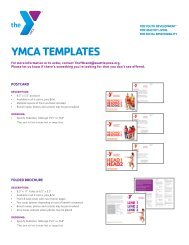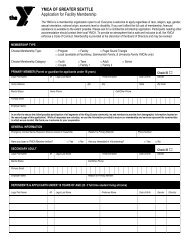washington mock trial rules of evidence - YMCA of Greater Seattle
washington mock trial rules of evidence - YMCA of Greater Seattle
washington mock trial rules of evidence - YMCA of Greater Seattle
Create successful ePaper yourself
Turn your PDF publications into a flip-book with our unique Google optimized e-Paper software.
institution, association, pr<strong>of</strong>ession, occupation, and calling <strong>of</strong> every kind, whether or notconducted for pr<strong>of</strong>it.(18) Learned treatises -- To the extent called to the attention <strong>of</strong> an expert witness uponcross examination or relied upon by the expert witness in direct examination, statementscontained in published treatises, periodicals, or pamphlets on a subject <strong>of</strong> history,medicine, or other science or art, established as a reliable authority by the testimony oradmission <strong>of</strong> the witness or by other expert testimony or by judicial notice.(21) Reputation as to character -- Reputation <strong>of</strong> a person's character among associates orin the community.(22) Judgment <strong>of</strong> previous conviction -- Evidence <strong>of</strong> a judgment finding a person guilty <strong>of</strong> acrime punishable by death or imprisonment in excess <strong>of</strong> one year, to prove any factessential to sustain the judgment, but not including, when <strong>of</strong>fered by the government in acriminal prosecution for purposes other than impeachment, judgments against personsother than the accused.Comment and example, 803(1), (present sense impression): This exception is commonlycalled the “present sense impression” exception. The rule presumes that a spontaneousstatement, i.e. one made before the declarant has had a chance to think about the event heor she describes, reduces some <strong>of</strong> the risk <strong>of</strong> misrepresentation. When the person whowas just involved in a car accident says to a witness, “Why didn't I put on my seat belt?”the statement is undoubtedly a spontaneous utterance and is not objectionable as hearsay.Comment and example, 803(2), (excited utterance): This exception is called the “excitedutterance” exception. A victim's telephone call to the police describing how the defendantraped her and left her along the road several hours before the call would probably beadmissible as an “excited utterance.” The key to admissibility is whether the declarant wasstill under the influence <strong>of</strong> the event (i.e., emotionally charged from the effects <strong>of</strong> theevent) at the time the statement was made. The belief is that a statement made while thedeclarant is still under the influence <strong>of</strong> or affected by the event is more reliable and lesslikely to be fabricated than one made after the declarant has calmed down and taken theopportunity to think about the event.Comment and example, 803(3), (state <strong>of</strong> mind): Statements which describe the declarant'sthen-existing state <strong>of</strong> mind fall within this exception. A statement <strong>of</strong> the declarant’s intentor plan also falls within this exception when <strong>of</strong>fered to prove that the intent or plan waslater carried out by the declarant. However, the exception does not apply to statementsthat describe past states <strong>of</strong> mind. A witness will be permitted to testify that the victim <strong>of</strong>a spousal assault told her, “I fear my husband” because it was a statement <strong>of</strong> the victim'sstate <strong>of</strong> mind at the time the statement was made. On the other hand, the witness will not



